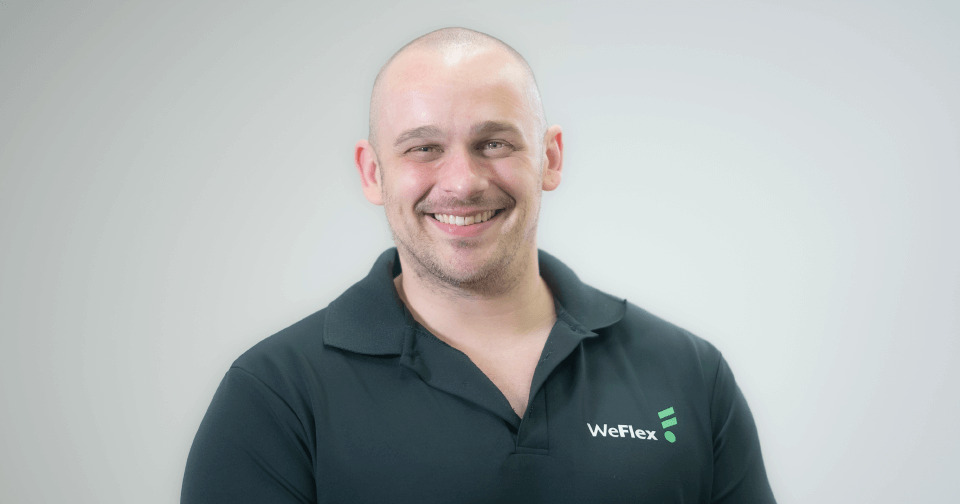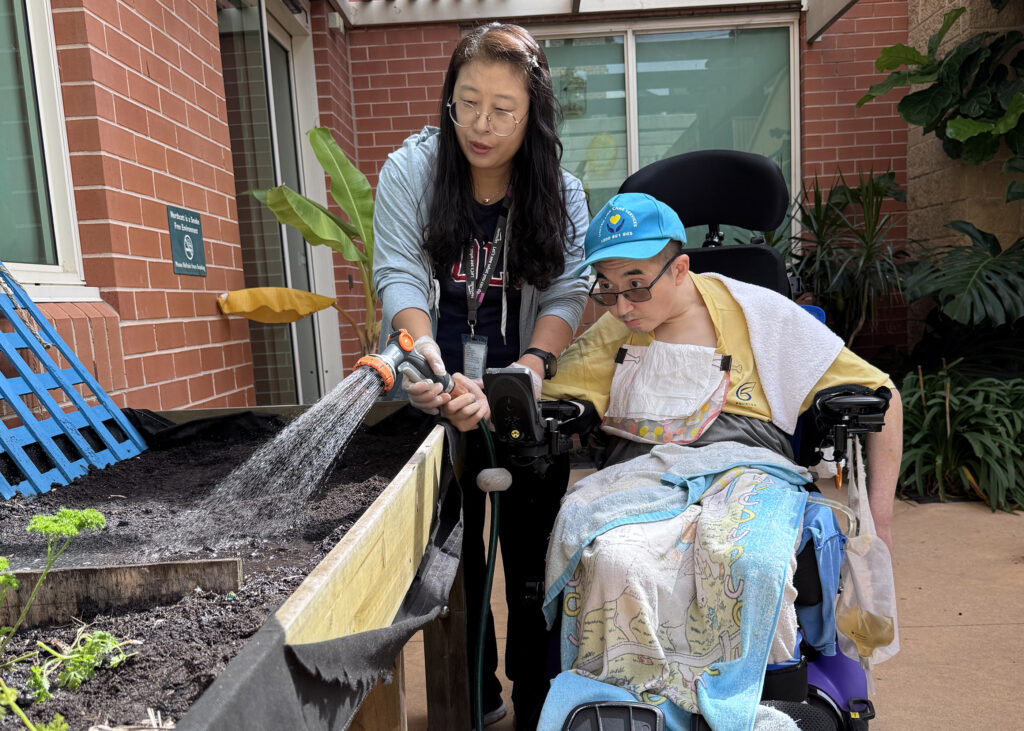
Tommy Trout, the owner of WeFlex gives us four tips to a healthier lifestyle and explains why he started WeFlex. My best friend and LITTLE brother is Jackson AKA Jackie Boy. We have been inseparable since birth, and nothing has changed. We have similar interests, enjoy the same movies and TV shows as well as being the same type of weird. The only thing we don’t have in common is labels.
You see, Jackie Boy is autistic, and I am not. Technically I’m ‘neurotypical’ but Jackie Boy refers to me as ‘neuro-typical-ish’. Why? I grew up in a household with both a Dad and little brother on the spectrum – and we joke that it’s rubbed off a little on me.
That one difference between us became glaring when our Dad passed away. He died of (very) preventable health conditions and at the funeral it hit me. My whole life I was encouraged to exercise and be healthy. I played sports my whole life, lost many vegetable stand offs at dinner – but Jackie Boy was held to a different (lower) standard. He was left to his interests (drawing) and as long as he ate something he was good. And now at Dad’s funeral – I’m a healthy and fit young man, and Jackie Boy was a sedentary and unhealthy young man.
Honestly, taking Jackie Boy to the gym was something I never really considered – it was just off my radar completely. Even as a support worker, ‘exercise’ was usually a walk around the block. I had the unsettling realisation that my standards for Jackie Boy were low as well when it came to health and fitness. At the same time he had a realisation about his health seeing Dad get buried well before his time. And Jackie Boy’s health and fitness journey began – inspiring the establishment of WeFlex.
Since starting this business and working with all kinds of clients to get fit and healthy one thing has become obvious. ANY BODY can get fitter and healthier. Since starting, Jackie Boy has lost around 14 kgs, exercises daily and has reigned in his eating. Outcomes that were once considered impossible (hello low expectations). The truly remarkable part is the unintentional benefits from his improved health. Such as:
- Better sleep
- He’s less anxious in public
- Improved confidence (maybe a bit too confident)
- He regulates his emotions better
- Increased social network – making friends at his local gym
And these aren’t just anecdotal either. There have been extensive reviews of research done on the impacts of exercise on people living with disability and the results are incredible. In a cohort of people with ASD they found that regular and intense exercise saw decreases in aggression, stereotypy (repetitive behaviour), elopement (flight), and off-task behaviour with increases in concentration, behaviour and emotional regulation. It turns out the people society has spent the least amount of effort encouraging to exercise would benefit the most – which in turn benefits their family.
The best part is health and fitness is relative to the person. Some of my best and fittest clients began at zero. Like, it took two turns to get them inside the gym zero. By setting simple, achievable goals with the person you can eat this elephant one bit at a time. The best example of this is Chris Nikic. In 2020, he became the first person with Down Syndrome to complete an Ironman. Not a ‘special needs’ Ironman. And actual Ironman. When asked how he did it, he explained the 1% rule. Everyday he aimed to get 1% better. Going from a regular kid to an Ironman athlete 1% at a time. Now, I’m not suggesting you sign up for an Ironman, but instead consider ways we all can get 1% healthier every day.
To help you with this, I’d encourage you think about health in 4 goals.
1. Improve your sleep
Sleep is essential, and there is research suggesting that most people aren’t getting enough. The risks of that are decreased emotional regulation, low energy, difficulty to concentrate or remember and we also typically eat worse when we’re tired too. The benefits of improving your sleep? Pretty much the opposite of this! Better mood, mentally sharper, more energy and there’s even evidence that sleeping longer helps you lose weight. What can you do that is simple, easy and zero cost?
- Set a consistent sleep schedule – ensuring you’re getting between 7-9 hours a night.
- Get lots of natural light first thing in the morning (outside is best) and decrease light towards bedtime.
- Don’t eat right before bed.
2. Manage your stress
Stress can be seen as quite a vague term, but don’t underestimate the impact it has on your body. Stress is connected to your nervous system which is arguably the most powerful and influential system in your body. Too much stress can release excessive hormones like cortisol that can lead to a number of health problems like; headaches, heart disease, weight gain and disrupted sleeping. What are some simple ways to support your nervous system?
- Deep breathing or just focusing on your breathing
- Getting outside
- Meditating
- Exercising
- Drinking lots of water
- Quality sleep
3. Improve your diet
This one is pretty obvious – but is often neglected. We are all guilty of not really paying attention to what is going into our bodies. Essentially good nutrition is concerned with two things; getting enough energy for the day and consuming the right mix of nutrients (like protein, fats, etc) as well as vitamins and minerals. It’s easy to fall into the trap of eating enough energy that is nutritionally deficient or eating a brilliant range of nutritious foods, but not enough of them. Things you can do starting today:
- Drink more water. It’s very hard to drink too much water, but very easy to not drink enough.
- You want a plate that is colourful (not with skittles) with fruits and vegetables. Always balance.
- Don’t starve yourself. Everybody wants to lose weight yesterday and so starve themselves to do so. It doesn’t work, and you’ll be miserable. Eat healthy and often.
- Help your digestive system out by NOT lying down after eating for 30 minutes.
4. Increase your physical activity
One of the biggest determinants of health is sedentary lifestyle – basically how active are you day-to-day. A sedentary lifestyle will drastically increase the risk of heart disease, diabetes, obesity as well as poor mental health. An active lifestyle on the other hand will have the opposite effect, and will ward off the premature development of conditions like osteoporosis. Again, you don’t need to sign up for a triathlon (but if you want to get in touch with WeFlex we’ll support you!). Here are some simple tasks you can do starting today:
- Go for regular walks
- Limit the amount of time you sit in one go – every two hours stand up and move your body
- Stretch
- Engage in activities that are incidental exercise, like gardening
- If keen, visit your local gym or look for workout at home videos on YouTube
The best part is that it’s all at your pace and is not one size fits all. WeFlex is here to support you in your goals – no matter how big or small. We are thrilled to be partners with Northcott and will be looking to provide WAY more information to support you on your fitness and health journey moving forward.
Together, WeFlex.



Accessibility and Inclusivity
We respect and honour Aboriginal and Torres Strait Islander Elders past, present and future. We acknowledge the stories, traditions and living cultures of Aboriginal and Torres Strait Islander peoples on this land and commit to building a brighter future together.
Read more about our commitment to reconciliation

